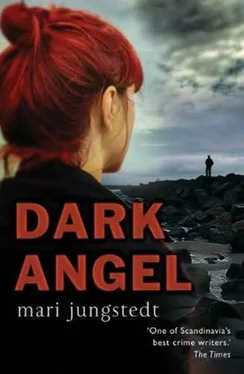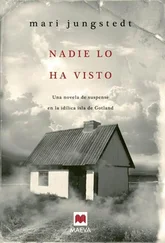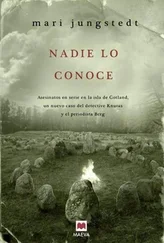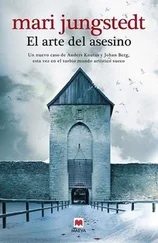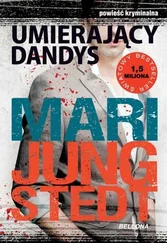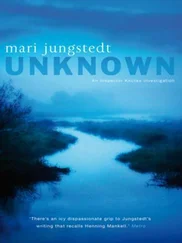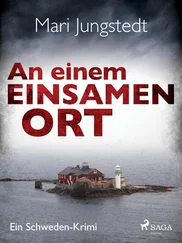Karin’s face seemed to close up. It was obvious that she didn’t want to discuss the topic. They continued driving south in silence.
Knutas looked out of the window again, wondering what could be weighing on her. He’d worked with Karin Jacobsson for more than fifteen years and she was his closest confidante. At least from his point of view. He told her everything, including any problems he experienced with his family. She was a good listener, always willing to offer encouragement and advice. But when it came to Karin’s own personal life, that was a whole different story. As soon as the conversation turned to her, she became guarded and silent.
A year ago Knutas had promoted Jacobsson to Deputy Detective Superintendent and second in command, which had stirred up some bad feelings at the station, even though most people were positive about her new role. Malicious comments were heard from a handful of older male officers who didn’t like being passed over for a much younger colleague who also happened to be a woman. Jacobsson’s petite stature hadn’t made it any easier for her to win their respect. The fact that she didn’t live according to the expected norms had also given rise to speculations. Although she was forty years old, she still lived alone with her cockatoo named Vincent. She devoted most of her free time to football, both as a coach and as a player in the women’s league.
‘Have you heard anything more about Kihlgård?’ Knutas asked, mostly just for something to say.
‘Yes. He was in Karolinska Hospital for a week, and they did a lot of tests, but he’s home now. The doctors don’t know what’s wrong with him.’
‘I didn’t even know that he was in hospital. What sort of symptoms does he have?’
‘He just generally doesn’t feel good. He’s suffering from nausea and dizziness.’
‘How long will it take to get the results of the tests back?’
‘A week or two.’
‘We should send him flowers.’
‘That’s a good idea.’
He glanced at Karin. She looked more tired than usual.
‘You know that you can talk to me if there’s something bothering you,’ he said. ‘I’m always willing to listen.’
‘Thanks, Anders. I know that. Maybe we could talk some other time. Not now.’
‘Are you sure?’
‘I’m sure.’
Knutas changed the subject in order to break the oppressive mood that had settled over them.
‘What do you think about the case? Any ideas about a motive?’
‘It’s impossible to say. There are several likely motives, but I don’t think it’s any coincidence that Algård was murdered just a couple of weeks after Alexander Almlöv was assaulted. Especially considering all the criticisms that have been hurled at Algård lately.’
‘Who do you think is a likely candidate?’
‘Either someone who is close to Alexander, or someone connected to the bouncers, who both happen to be involved in criminal activities. Or maybe some fanatic who’s tired of all the youth violence and wants to take matters into his own hands. There are all sorts of variations to consider. Nine times out of ten the perp is a member of the immediate family. So it could also be someone like that.’
‘Maybe it’s no coincidence either that Algård was in the process of getting a divorce.’
‘Sure. And it’s a strange thing about this mistress of his,’ said Jacobsson pensively. ‘We need to find out who she is. And does Mrs Algård know that her husband was playing around on the side? Maybe not, if the love affair is relatively recent, but somebody in their circle of friends must know something. Do you think the mistress was at the party?’
‘Maybe. We’ll have to wait and see what the interviews can tell us. She may have been out of town. Maybe she doesn’t even know about the murder yet.’
WHEN JACOBSSON AND Knutas reached the Hamra Inn, they pulled over and stopped in the deserted car park. The inn was incredibly popular in the summertime, but now it looked practically abandoned. Several signs indicated that the Coconut Bar was to the left, while Pepe’s Tex-Mex was on the right. The rustic wooden tables were stacked against one wall and the restaurant was glaringly empty. A few messages had been tacked up on a decrepit-looking bulletin board near the car park. ‘Flea market in Burgsvik’, ‘Weaving class in Havdhem’, ‘Alcoholics Anonymous meets every Tuesday in the Hablingbo community centre’, ‘Sheep shearing – cheap’, and ‘Lost cat’.
‘We need to go left here and head down towards the sea,’ said Jacobsson, turning the car on to a gravel road. The flat landscape was mostly cultivated fields. This was farm country, with one farmstead right next to another. Healthy-looking cattle grazed in the pastures and flocks of sheep stared at the car as they drove past. The sea glittered up ahead. They were almost at the southernmost tip of Gotland, far from their own familiar stomping grounds.
They drove along a narrow road that followed the shoreline. The farm at the end of the road belonged to the Algård family. As they pulled into the gravel-covered yard in front of the house, two greyhounds appeared, barking loudly. Knutas, who was afraid of dogs, hesitantly climbed out of the car, never taking his eyes off the two animals. Jacobsson called out to them and they instantly loped over to her, barking happily. The front door of the house opened and a shrill whistle rang out across the yard. The dogs immediately stopped their romping and raced to join their owner.
Elisabeth Algård showed Knutas and Jacobsson into the house. They sat down in a big country kitchen replete with all the farmhouse charms: blue-and-white-checked cotton curtains, exposed ceiling beams, a big brick fireplace, a scoured wood floor and a gate-legged table, which was the biggest and most rustic Knutas had ever seen. The tall windows offered an expansive view of the fields and, off in the distance, the sea. The widow served them coffee and almond buns without first asking if they’d like any. She shooed the dogs out of the kitchen and closed the door. With a heavy sigh she sat down on a chair across from the two officers. Her thin, sinewy figure was clad in jeans and a short-sleeved cotton blouse. Her wispy, smoky-coloured hair was pulled back and fastened with a clasp at the nape of her neck. She wore no make-up. Her lips were thin, making a narrow streak of her mouth. She couldn’t be described as a beauty, but she had pleasing, distinctive features. As she poured the coffee, Elisabeth Algård looked Knutas right in the eye.
‘What do you want to know?’
‘First of all, we want to offer our condolences. Unfortunately, we do need to ask you quite a few questions. When was the last time you saw Viktor?’
‘Saturday afternoon, before he left for the party.’
‘How did he seem?’
‘He was in a great mood, even though he tried to hide it.’
Knutas looked at her enquiringly.
‘Viktor wanted a divorce,’ she said tonelessly.
‘We know about that. Can you tell us why?’ said Jacobsson as she bit into a bun.
‘It was a bolt out of the blue. I can’t understand it. Good Lord, we’ve been married for thirty-two years. We have two grown children, this farm with all the animals and my studio. Viktor had his own company. Our life was good. It was calm and pleasant and the days passed enjoyably. All of a sudden he wanted to destroy everything we’d built together.’
‘When did he tell you that he wanted a divorce?’
‘A couple of weeks ago. Right after that boy was assaulted. At first I thought that was the reason – because Viktor was so upset by all the uproar and criticism. But he said it had nothing to do with that.’
‘So what did he give as his reason?’
‘Reason? He didn’t have a reason. He just said that he wanted to lead his own life. Have you ever heard anything like it? He said he was longing to focus on himself, on his own happiness. “You only live once,” he said, “and I don’t want to end up a bitter man.”’
Читать дальше
